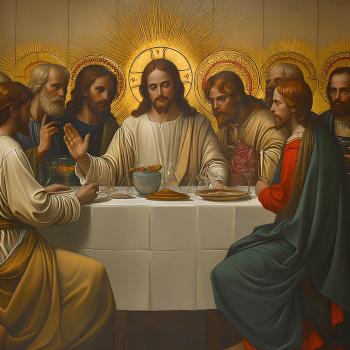by Lauren Reyes
Churches get bad rap these days. “Churchy” has become insulting, and Christians are searching for community outside of church walls. This institution that has existed for over two millennia is suffering an image problem: she’s often seen as crumbling, weak, and irrelevant. What happened? My friends, something in how we view the Church has gone wrong.
Let me start out by explaining the position from which I’m reasoning.
- I love the Church. I grew up in a pastor’s family, I graduated from seminary, my husband is a pastor, and we plan to become overseas missionaries with our denomination. Greater than my love for the Church, though, is my conviction that the Church matters and is part of God’s plan.
- The Church is full of sinners and far from perfect. When I was twenty years old, my dad’s pastoral ministry ended when a moral failure was discovered and he left our family. God is good and has taken care of us; I just want you to know that I’m not disillusioned about issues in the Church today. There is some ugly stuff.
- I’m a millennial, and while in some ways I do embody the stereotype, the millennial tendency to avoid commitment drives me crazy.[1] I firmly believe there are things that are worth staying with, investing in, and committing to, through thick and thin. I’m speaking broadly here, because I know many of my peers would agree with me, but this overall millennial mindset is the catalyst for my thoughts on the topic of the Church.
- By “Church” I mean the global community of believers who gather together: in sanctuaries, on Skype calls, in service projects, or in secret. This Church with a capital C incorporates many smaller churches with a lower-case c: the thriving churches, the dying churches, the church you attend, and the church you think is too _______ [insert the term of your choice].
So, I love this imperfect organism called the Church (and her arms and legs which take the form of local churches) and I take issue with the way millennials relate to it today. Why have the words “church” and “churchy” became derogatory terms? Their original use was quite the opposite:
“And I tell you, you are Peter, and on this rock I [Jesus] will build my church, and the gates of hell shall not prevail against it.” (Matt 16:18)
“And [Christ] is the head of the body, the church. He is the beginning, the firstborn from the dead, that in everything he might be preeminent.” (Col 1:18)
This thing – the Church – that Jesus established and reigns over has been diminished to an insult. “Churchy” means that something is too traditional, too institutional, and too unpopular. I’ve heard it said with a bitter aftertaste and a latent desire to be rid of it, and to be honest this makes me angry. Of course I agree that the Church isn’t perfect; it’s a group full of sinners, and history has shown that sinners have a great tendency to muck things up, but the road doesn’t end there. It just means we’ve taken a few wrong turns. There is quite a bit of good to be had within the Church if we just look more carefully.
To those who reject denominational structure in favor of non-denominational churches, I would say they’ve missed an important fact: these non-denominational churches still need a creed to abide by and a structure within which their leaders can function. These folks have simply left a large organism for a small one. Both will have troubles, because both are comprised 100% of sinners like me. I happen to believe that denominations, while imperfect, have potential to be good institutions which provide accountability and open ministry doors that might otherwise remain closed.
To those who refrain from becoming church members because they believe institutional churches are full of bigots and hypocrites, I would say that the struggle to be tolerant and authentic is real for all people, both inside and outside church walls. Rather than abandon fellow believers, why not join them in striving to create more welcoming and genuine environments in their congregations? Churches have historically fallen short in the area of expressing love to all people, and thus the accusations of bigotry have stuck. But, if anyone can turn it around, it will be people like you and me who decide every day to love our fellow sinners. I don’t believe that rejecting the Church is the answer.
To those who reject the Church in favor of something more “meaningful,” I would say that alienating themselves from their spiritual community isn’t the answer. Saint Cyprian of Carthage said, “He can no longer have God for his father, who has not the church for his mother.”[2] That’s stated in the extreme, but I believe it’s true that we can’t turn our back on our spiritual mother without losing something precious along the way. Sure, we can leave one local church family for another (for a house church, or cell group, or Sunday morning discussion over breakfast), but it’s incorrect to think we could ever find a spiritual home that is not, in some way, an extension of the Church, in practice if not in name. The Church is what Jesus gave us, and I firmly believe it is part of God’s plan for his people to grow and advance his kingdom. There is no “other” community of believers that’s healthier than the Church or immune to her ills.
It’s certainly true that the Church is lived out in the lives of all Christians individually, but I believe its ultimate embodiment is when believers come together at a local church. By identifying together and communing in Christ, local churches are living out the mission of the global Church in a way that would be impossible if each person attempted it on his or her own. Why wouldn’t we want to seek to further God’s kingdom together?
Now, occasionally there are churches in real trouble. They might need to close, resources might need to be reallocated, pastors might need to transition out of ministry, and believers might need to seek a new congregation. I don’t want to romanticize small churches with inflexible members more committed to their particular seat on the back row than to telling the Gospel to people outside their walls. The fact that churches are flawed means that real hurt has happened and there are real problems to be dealt with.
However. And this is an especially important however. I wholeheartedly believe in the life-changing power of grace: in my own life, for churches, and for the Church. When people say they’re tired of churches and don’t need them to be saved, when they won’t join because they don’t like denominational structure, when they want to be a Christian but wash their hands of the Church, and when they speak of the Church with practiced cynicism, my heart breaks for what I believe they’ve misunderstood and for the tragic slight that has been done to this organism of which Jesus himself is the head. My heart breaks because people have given up hope that the Church (and churches) can be redeemed. But I haven’t lost hope.
The reason I don’t believe “church” is a dirty word is because I have hope for what Jesus is still going to do through her. I don’t think the last word of the story has the Church abandoned on the side of the road. There’s another ending in sight, and that’s what gives me hope. The prophet Ezekiel’s visions of the restoration of Israel are nothing short of extraordinary, and I believe they’re relevant here. I think that what we need is to see life breathed back into these dry bones (Ezekiel 37). We need God to reinvigorate our churches, and I believe his preferred way of doing that would be through people like you, me, sixty-year-old elders, forty-five-year-old deaconesses, and thirty-year-old parents of toddlers. If the Church is going to have life again and be a river of life for others, like Ezekiel’s vision of the temple (Ezekiel 47), it is going to come from God, and he will use his children to work from within the Church’s proverbial walls and my local church’s literal walls. “Churchy” won’t be an insult any longer.
[1] http://www.pewsocialtrends.org/2014/03/07/millennials-in-adulthood/
[2] http://www.newadvent.org/fathers/050701.htm
 Lauren Reyes is married to Mark (a pastor of young adult and outreach ministries) and lives in Great Falls, Montana where she works in student development at a local college. She and Mark graduated from Asbury Theological Seminary and in their free time they enjoy running, hiking, and spoiling their two dogs (Moxie and Lewis) and their cat (Luna).
Lauren Reyes is married to Mark (a pastor of young adult and outreach ministries) and lives in Great Falls, Montana where she works in student development at a local college. She and Mark graduated from Asbury Theological Seminary and in their free time they enjoy running, hiking, and spoiling their two dogs (Moxie and Lewis) and their cat (Luna).













